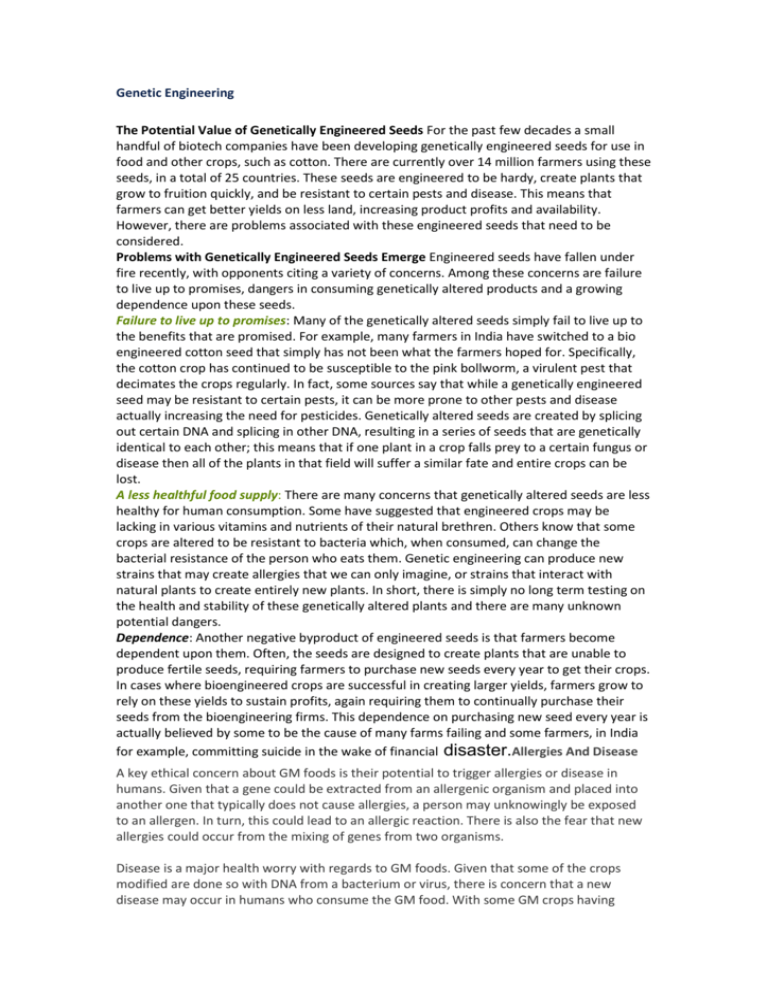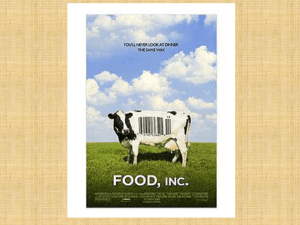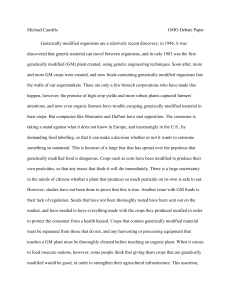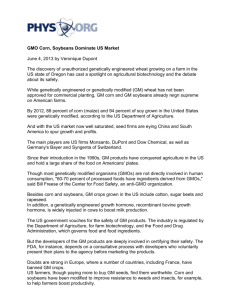Genetic Engineering notes and links
advertisement

Genetic Engineering The Potential Value of Genetically Engineered Seeds For the past few decades a small handful of biotech companies have been developing genetically engineered seeds for use in food and other crops, such as cotton. There are currently over 14 million farmers using these seeds, in a total of 25 countries. These seeds are engineered to be hardy, create plants that grow to fruition quickly, and be resistant to certain pests and disease. This means that farmers can get better yields on less land, increasing product profits and availability. However, there are problems associated with these engineered seeds that need to be considered. Problems with Genetically Engineered Seeds Emerge Engineered seeds have fallen under fire recently, with opponents citing a variety of concerns. Among these concerns are failure to live up to promises, dangers in consuming genetically altered products and a growing dependence upon these seeds. Failure to live up to promises: Many of the genetically altered seeds simply fail to live up to the benefits that are promised. For example, many farmers in India have switched to a bio engineered cotton seed that simply has not been what the farmers hoped for. Specifically, the cotton crop has continued to be susceptible to the pink bollworm, a virulent pest that decimates the crops regularly. In fact, some sources say that while a genetically engineered seed may be resistant to certain pests, it can be more prone to other pests and disease actually increasing the need for pesticides. Genetically altered seeds are created by splicing out certain DNA and splicing in other DNA, resulting in a series of seeds that are genetically identical to each other; this means that if one plant in a crop falls prey to a certain fungus or disease then all of the plants in that field will suffer a similar fate and entire crops can be lost. A less healthful food supply: There are many concerns that genetically altered seeds are less healthy for human consumption. Some have suggested that engineered crops may be lacking in various vitamins and nutrients of their natural brethren. Others know that some crops are altered to be resistant to bacteria which, when consumed, can change the bacterial resistance of the person who eats them. Genetic engineering can produce new strains that may create allergies that we can only imagine, or strains that interact with natural plants to create entirely new plants. In short, there is simply no long term testing on the health and stability of these genetically altered plants and there are many unknown potential dangers. Dependence: Another negative byproduct of engineered seeds is that farmers become dependent upon them. Often, the seeds are designed to create plants that are unable to produce fertile seeds, requiring farmers to purchase new seeds every year to get their crops. In cases where bioengineered crops are successful in creating larger yields, farmers grow to rely on these yields to sustain profits, again requiring them to continually purchase their seeds from the bioengineering firms. This dependence on purchasing new seed every year is actually believed by some to be the cause of many farms failing and some farmers, in India for example, committing suicide in the wake of financial disaster.Allergies And Disease A key ethical concern about GM foods is their potential to trigger allergies or disease in humans. Given that a gene could be extracted from an allergenic organism and placed into another one that typically does not cause allergies, a person may unknowingly be exposed to an allergen. In turn, this could lead to an allergic reaction. There is also the fear that new allergies could occur from the mixing of genes from two organisms. Disease is a major health worry with regards to GM foods. Given that some of the crops modified are done so with DNA from a bacterium or virus, there is concern that a new disease may occur in humans who consume the GM food. With some GM crops having antibiotic-resistant marker genes, there is also the worry that these genes could be passed on to microbes that cause disease and health problems in humans. With widespread antibiotic resistance currently already occurring, any new resistance could prove disastrous. Damage To The Environment Damage to the environment is another ethical fear with regards to GM crops. Unfortunately, the technology is still new enough that there is much we do not know about the effect of GM crop production on the environment. Long-term studies take decades to complete and most studies of GM crop production involve short-term effects of the technology. Another ethical issue around GM crops is our ability to contain them in a specific area. There are fears that if these crops do negatively impact the environment, they will spread in an out-of-control fashion and we will not be able to stop their damaging effects. For instance, one type of sugar beet that had been engineered to be resistant to a specific herbicide ended up unintentionally having the genes to resist a different herbicide. When farmers went to eliminate the crop, they still found that a small percentage had survived. Genetic modification Genetic modification (GM) is any process that changes the genetic material of an organism (plant, animal, bacteria or virus) in order to make it capable of producing new substances or performing new or different functions. Cross-Pollination Cross-pollination is a challenge for any crop growth but it can typically be managed if care is taken to use good growing practices. There is the possibility of genes from GM foods spreading to other plants and crops, which could create overzealous weeds that can't be contained at all. Food Web And Risks Risks to the food web are a very real ethical concern around GM technology. Any pesticide or herbicide from the crop could harm animals and other organisms in the environment. For example, GM sugar beets that were produced to be resistant to herbicides did successfully reduce weeds. However, Skylark birds that consume the seeds from this particular weed would now be required to find a new food source, thereby endangering their existence. An animal could also consume the GM crop itself, which means that if the crop has been engineered to produce a pesticide, the animal may become ill and die. In one North American study, caterpillars of the monarch butterfly were killed when they fed on pollen from GM corn crops. Some Pros and Cons Advantages • One of the major advantage is that they help in controlling the occurrence of certain diseases. There are some foods that cause allergy to people when consumed. By modifying the DNA system of these foods, the properties causing these allergies are eliminated successfully. • It is also said that these foods grow faster than the foods that are grown in the traditional manner. Due to this, productivity increases, providing the population with more food. Apart from this, it is claimed that the foods are a boon in places which experience frequent droughts, or where the soil is incompetent for agriculture, due to which it is difficult to grow normal crops. • At times, genetically engineered food crops can be grown at places with unfavorable climatic conditions too. A normal crop can grow only in specific season or under some favorable climatic conditions. • Though the seeds for such foods are quite expensive, their cost of production is said to be lesser than that of the traditional crops. The main reason for this is that these foods have natural resistance towards pests and insects and so, not many pesticides and insecticides have to be sprayed on them. This reduces the necessity of exposing genetically modified crops to harmful pesticides and insecticides, making these foods free from chemicals and environment friendly as well. • Genetically engineered foods are said to be high in nutrients, and contain more minerals and vitamins than those found in traditionally grown foods. Other than this, these foods are known to taste better. Another reason for people opting for genetically engineered foods is that they have an increased shelf life and so there is less fear of foods getting rotten quickly. Disadvantages • The biggest threat caused by this food is that they can have harmful effects on the human body. It is believed that consumption of these genetically engineered foods can cause the development of diseases which are immune to antibiotics. Moreover, according to some experts, people who consume such foods have high chances of developing cancer. Besides, as these foods are new inventions, not much is known about their long-term effects on human beings. As the health effects are unknown, many people prefer to stay away from these foods. • In many countries, manufacturers do not mention on the label that foods are genetically manufactured because they think that this would affect their business. However, this is not a good practice as consumers do not get the chance to decide whether they should really opt for these foods. • Many religious and cultural communities are against such foods because they see it as an unnatural way of producing foods. Many people are also not comfortable with the idea of transferring animal genes into plants and vice versa. Also, this crosspollination method can cause damage to other organisms that thrive in the environment. Experts are of the opinion that with the increase of such foods, developing countries would start depending more on industrial countries because it is likely that the food production would be controlled by them in the time to come.GMO Myths and Truths Genetically modified (GM) crops are promoted on the basis of a range of far-reaching claims from the GM crop industry and its supporters. They say that GM crops: Are an extension of natural breeding and do not pose different risks from naturally bred crops Are safe to eat and can be more nutritious than naturally bred crops Are strictly regulated for safety Increase crop yields Reduce pesticide use Benefit farmers and make their lives easier Bring economic benefits Benefit the environment Can help solve problems caused by climate change Reduce energy use Will help feed the world. However, a large and growing body of scientific and other authoritative evidence shows that these claims are not true. On the contrary, evidence presented in this report indicates that GM crops: Are laboratory-made, using technology that is totally different from natural breeding methods, and pose different risks from non-GM crops Can be toxic, allergenic or less nutritious than their natural counterparts Are not adequately regulated to ensure safety Do not increase yield potential Do not reduce pesticide use but increase it Create serious problems for farmers, including herbicide-tolerant “superweeds”, compromised soil quality, and increased disease susceptibility in crops Have mixed economic effects Harm soil quality, disrupt ecosystems, and reduce biodiversity Do not offer effective solutions to climate change Are as energy-hungry as any other chemically-farmed crops Cannot solve the problem of world hunger but distract from its real causes – poverty, lack of access to food and, increasingly, lack of access to land to grow it on. Terminator Technology is the most controversial technique in genetic engineering to date. In terminator seeds, there are three basic genes that have on and off switches – designed to prevent farmers from saving seeds from year to year. The last engineered gene does its job very late in the development of the seed when the inducer gene turns on a control switch so that a toxin is produced. Technically, the strategy behind the patent is to kill only the embryos while leaving such other important seed components as oils and proteins intact. The technology can be applied in several ways, but generally three steps are involved: terminator genes are added to a crop by scientists; seed companies start the terminator process before the seeds are sold by adding an inducer; and farmers grow plants that produce sterile seeds. This technology is especially worrisome to farmers of all countries since it provides complete control by companies as to what, if anything, farmers are allowed to grow. Not only will they create total dependency on GE companies; but the plants can spread sterility to local crops and wild plants, as well as posing a huge threat to food security and farmers' rights. http://www.gefree.org.nz/ http://www.youtube.com/watch?v=1H9WZGKQeYg - you tube clip http://en.wikipedia.org/wiki/Genetically_modified_food http://www.popsci.com/science/article/2011-01/life-cycle-genetically-modified-seed http://www.globalresearch.ca/killer-seeds-the-devastating-impacts-of-monsanto-sgenetically-modified-seeds-in-india/ http://www.monsanto.com/newsviews/Pages/terminator-seeds.aspx http://www.globalissues.org/article/194/terminator-technology http://voices.yahoo.com/genetically-modified-foods-pros-cons-6437272.html http://www.geneticallymodifiedfoods.co.uk/




